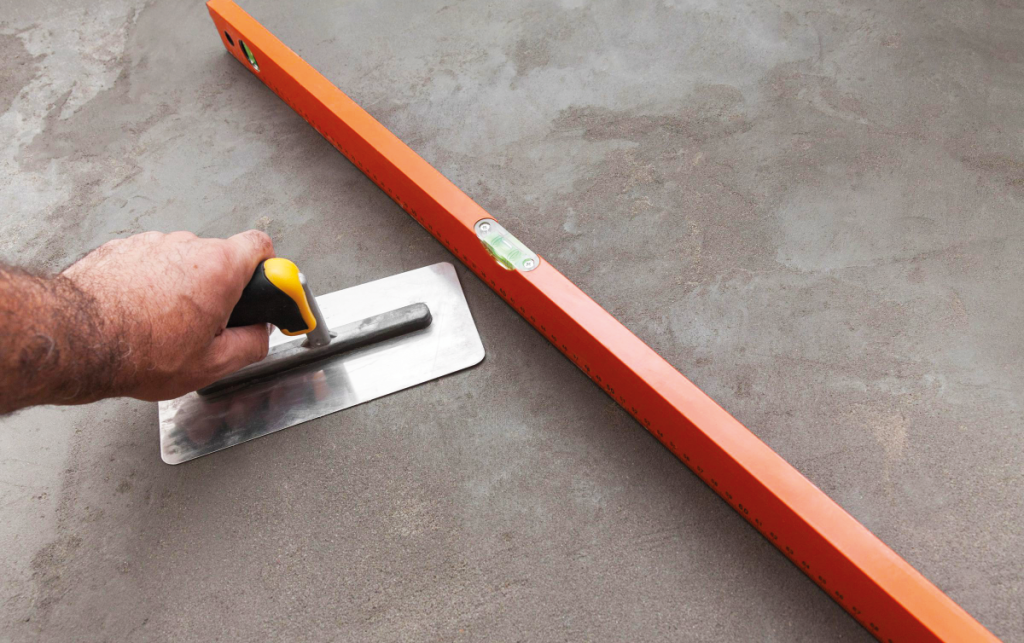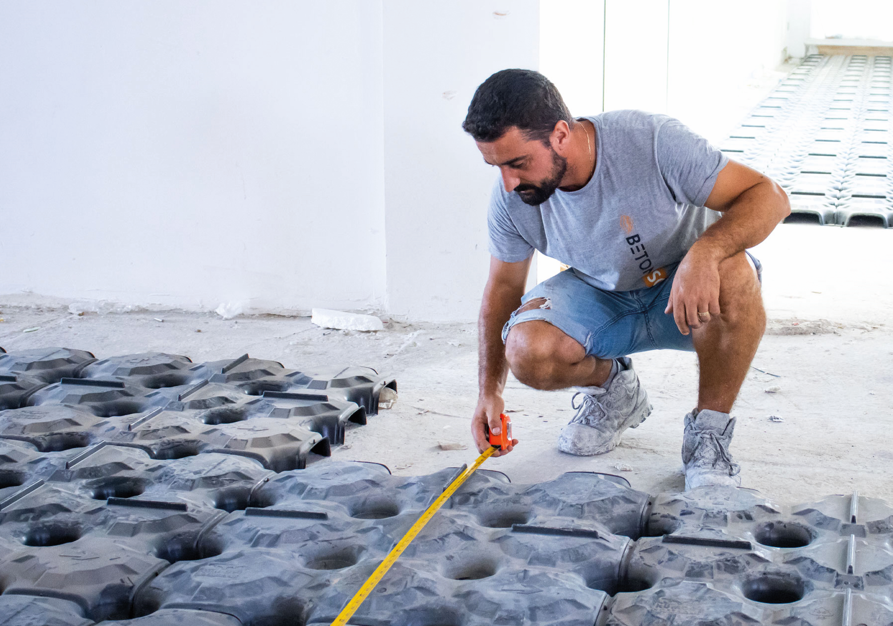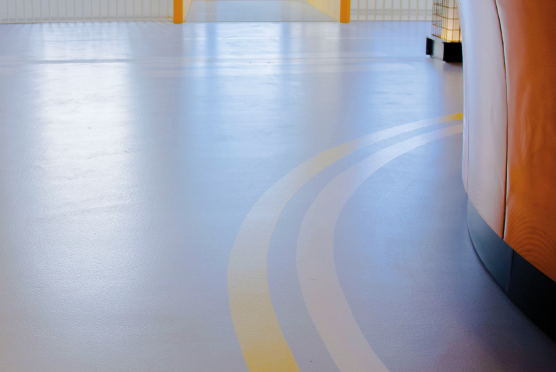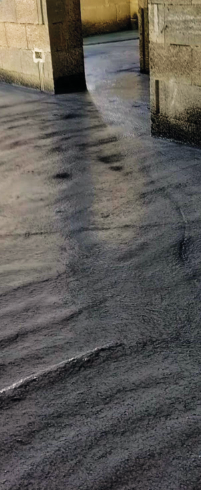Since it started operating just over a year ago, Beton Screed has quickly made a name for itself as a key player in the local market for structural slabs,
flooring foundations and finishes.
The company has earned a strong reputation for its high-quality bespoke work and its environmental awareness – which is not common in the local construction industry.
The men behind the company Giacomo Paci and Enrico D’Aniello have teamed up with local established veterans in the construction industry so as to marry quality supply and product expertise with local entrepreneurship. Paci has a solid track-record in the construction industry, having worked both in Europe and the United States. “I have been working in mosaics, tiling and marble, since I was young. I come from Arezzo in Tuscany and lived in Carrara – so I grew up around some of the world’s finest marble,” he explained, adding that it was his friend Enrico who brought him over to Malta, where he has now been working with screed for over 4 years. Enrico is a well-known football player in Italy, who is now coaching young players locally.
“Torba is the reason why so many people have tiles which have moved or cracked”
Beton Screed is now synonymous with quality flooring preparation. Since its inception a year ago, Beton Screed has installed flooring foundations and finishes for projects of the leading names in property development locally, including Best Deals Developments, Ballut Blocks, GAP, Elbros, Bilom and Baldacchino Construction. It is also the name behind the flooring of Farsons, The Grands Hotel in Gzira, the Ivy Hotel in St Julian’s, the villas of the Mellieha Holiday Complex and the Sunshine Snacks factory. “Traditionally ‘torba’ has been used for hundreds of years in Malta as the foundation for laying tiles. However, this is not an effective solution for new tiling materials – as they require preparation of a much higher quality. This is where screed comes in,” Giacomo explained, adding that it was very challenging to get screed to be accepted on the local market. “Torba is the reason why so many people have tiles which have moved or cracked. Modern ceramic tiles do not adhere to torba, as you need a C2 adhesive and not traditional sand and cement mortar,” he said.
Despite the initial resistance from the local industry, screed is a far superior solution to torba, so much so that large developers no longer use it to lay the flooring foundations. The elimination of this use also significantly reduces the dust, transport (and related congestion), and job duration, while simultaneously improving the finishing of the end job. “Viscocem, our top-level screed, is a self-leveling material, which you can set for different thicknesses – ranging from six centimetres up to twenty centimetres, as required. We prepare our own mix, tailored to the client’s needs. We transport it using our own screed delivery trucks as well as our own screed pumps and pipes and we can go up to 20 floors with it. This significantly reduces dust, pollution and general inconvenience, compared to torba,” Giacomo said.
“The elimination of the use of torba also significantly reduces the dust, transport, and job duration, while simultaneously improving the finishing of the end job”
photo: preparatory works being conducted by the Beton Screed professional team
Additionally, screed is much more lightweight (due to its specially designed product mix components), in comparison to torba. “Since we introduce so much air into the mix, screed also gives better acoustic properties, with a considerable reduction in sound transmission and also provides a better thermal barrier – stopping the loss of heat and coolness – which also gives screed energy-saving properties,” he added.
He further explained that Beton Screed undertook significant testing in order to develop its trademarked mix, which uses both local and recycled products. “We aim to be as green as we can in our operations. Only 1% of the mix uses external additives. The rest is composed of materials which are already present locally. Even the bags in which we store our mix are made of recycled material,” he added.
“Only 1% of the mix uses external additives. The rest is composed of materials that are already present locally”
In terms of manual labour and efficiency, screed is a clear winner over torba. “With screed we can lay up to 700 square metres per day, which covers approximately eight apartments. On the other hand, torba is so labour-intensive that you can only do one apartment per day,” Giacomo explained.
Since screed is lighter than torba, it has very good applications for the roofing of old houses which have stone-slab floors (‘xorok’) and do better with floor foundations which are more lightweight. Beton Screed are able to customise the screed mix, according to the recommendations of the client’s architect. The company rigorously tests samples of each batch of screed produced and provides clients with quality certification.
“With screed we can have thinner and stronger floor foundations and therefore architects can design buildings which have lower load bearing capacities. Due to regulatory height restrictions the reduced flooring slab thickness afforded by screed can translate into an additional floor for developers. You just can’t compare torba to screed – it would be tantamount to comparing a Fiat to a Ferrari,” Giacomo explained.
“Beton Screed carries a vast range of flooring products at different price points – covering installation of foundations to tiling and finishing. The company can also combine products … in order to be financially viable for all projects”
Beton Screed carries a vast range of flooring products at different price points – covering installation of foundations to tiling and finishing. The company can also combine products, which is important as screed is not intended for small surface areas, but is best-suited to substantial jobs, in order to be financially viable for all projects. “This is why we created our own backfill mix, which is much better than torba. This has become very popular for the domestic installation of flooring foundations for the do-it-yourself market, as it is ideal for use in bathrooms or garages and can be applied by both individuals and professionals,” Giacomo said before adding that “this bespoke backfill mix is very cost effective, easy to use and can be applied at any desired thickness.”
Beton Screed’s environmental focus extends beyond its screed production and the use of recycled materials even for the bags in which they sell their mixes. They also recycle tyres into raw material for the production of soundproof carpeting, which reduces sound transmission by 57 decibels. “This is a seamless, spray-on solution, which is fast and easy to apply – in fact we can apply up to 1000 square metres per day, which can be used on both walls and the floors, below the screed or over surfaces. In addition, the carpeting also provides protection for the electricity and piping, giving them an additional 6 millimetre buffer,” Giacomo said.
photo: Soundproofing carpeting laid out awaiting the Beton Screed laying
He explained that soundproofing is becoming an increasing concern in local construction, especially due to the small size of apartments and the use of bricks in buildings. The carpeting can also be used across a range of applications, including in football grounds (under the synthetic turf), on the surface of play parks as well as for roof insulation. It can also be added to asphalt for more silent roads, with a better grip.
“The company rigorously tests samples of each batch of screed produced and provides clients with quality certification”
In addition, Beton Screed also supplies and installs seamless epoxy based floor finishes which can be applied onto the screed, including in micro-cement finishing. This decorative epoxy is popular for surface flooring for car parks, supermarkets, retail outlets and offices. It can also be seen at the Farsons Brewery and Museum flooring. The epoxy comes in various finishes and the shape, design and colour can be all customised to the client’s preferences. It also comes with a ten year guarantee for the finishing, since it is very durable. Furthermore, its technical specifications – including the non-slip grading – can be tailored to the job’s requirements and can also be used around indoor pools and on walls. It is especially popular for use along the walls of industrial kitchens since it is seamless and much easier to clean than regular tiling.






Comment